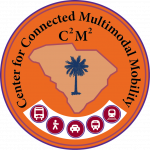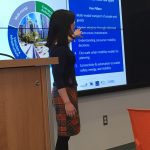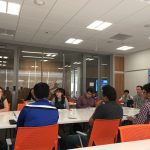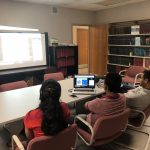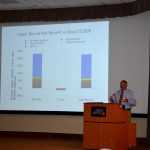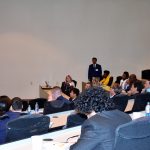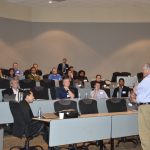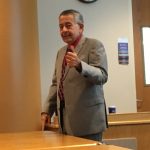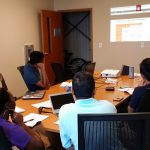On September 8th, 2017, C2M2 hosted its first University Transportation Center (UTC) speaker, launching a series of talks that will be offered every quarter. Our Center will invite speakers with both academic and industry backgrounds to speak to students and other interested participants on a wide range of transportation-related topics, such as the advancement of connected and autonomous vehicles, and the future of transportation. These talks will be offered as free webinars via our website and will be posted to our YouTube channel. The talks will be promoted on our social media outlets and through an email sent out to subscribers.
Dr. Yan (Joann) Zhou
Dr. Yan Zhou joined us in February and is a principal transportation systems analyst at Argonne National Laboratory. She also serves as the operations manager for US – China Clean Energy Research Center, Clean Vehicle Consortium and Truck Consortium. At Argonne, she develops fleet impact tool and uses such tools to assess the energy and emission impacts of advanced vehicle and fuel technologies. Those tools are widely used by government agencies, research institutes and consulting companies. She also works on market and technology trend analysis of advanced vehicle technologies and charging technologies of both China and US markets for the Department of Energy’s Vehicle Technology Office Analysis program and Clean Cities program. She is key research team member of DOE Smart Mobility National Laboratory Consortium. She is also a member of TRB alternative transportation fuel and technologies committee.
She spoke on two topics while in Clemson. Dr. Zhou’s first talk focused on: National Inter-City Freight Energy Analysis of Smart Technologies and Mode Shift.
Trucking is the dominant freight-carrying mode in the U.S., carrying nearly three-quarters of all annual tonnage transported. Trucking is also the second least energy-efficient mode for freight transportation behind aviation. Potential exists for freight energy use to be reduced through the application of smart technologies (e.g. platooning) and optimization of freight movement through mode shifting(e.g. shifting from trucks to rail). An on-going research revolves around the questions of “how could energy efficiency be maximized through the application of smart technologies and optimization of the freight network?”, and “what are the technologies and approaches which can impact the inter-city freight delivery, and how much impact could these changes potentially have on the over-all energy use for freight movement in the United States.”
The second half of Dr. Zhou’s talk focused on, National Energy Impact of Electrified Shared Mobility with Infrastructure Support, as described here
Infrastructure has long been a major barrier to alternative fuel vehicle (AFV) adoption such as plug-in electric vehicles (PEVS). The rapid development and deployment of advance charging technologies (e.g. DCFC, DWPT), and vehicle connectivity and automation technologies will impact vehicle ownership and use, electricity generation, and alternative fuel production/supply. Understanding the magnitude and sensitivity of these impacts is key to identifying barriers and accepting mainstream adoption of AFVs. An on-going project aims to quantify the national energy impact of shared PEVs as compared with privately owned PEVs assuming full infrastructure support (e.g. Level 2, DCFC, high power FC) based on regional simulation and modeling results.
Dr. Chris Hendrickson
Dr. Chris Hendrickson the Director, Traffic21 Institute, and Hamerschlag University Professor of Engineering Emeritus at Carnegie Mellon University joined us as a part of our Distinguished Speaker Series, and as our keynote speaker at our Fall Conference. Speaking on the following topic.
Transportation is undergoing revolutionary changes due to automation, improved communications and data analytic applications. This talk will provide an overview of research on transformational transportation technologies at Carnegie Mellon University through the Traffic21 Institute and related University Transportation Centers. In particular, Carnegie Mellon is known for over three decades of research on autonomous vehicles. Some policy implications of partial and full driverless vehicle automation will be highlighted.
Dr. Essam Radwan
Dr. Essam Radwan of the University of Central Florida was our first speaker. He spoke to gathered students and staff on September 8th, 2017. His talk on the “Simulation of Vehicular-Pedestrian Conflicts,” was well received, with over 35 attendees both on campus and via our webcast.
